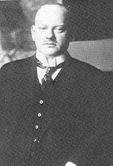Gustav Stresemann
Gustav Stresemann was born in 1878 and died in 1929. Stresemann took Weimar Germany out of its darkest hour – hyperinflation – to the so-called ‘Golden Years of Weimar’. He died just before the event that was to have a terminal impact on the Weimar Republic – the Wall Street Crash of 1929.
Stresemann was born in Berlin. In 1906, at the age of 28, he became a Reichstag deputy and he was elected the leader of the National Liberal Party in 1917. He later re-named this party the Peoples’ Party in 1919.

Gustav Stresemann
During World War One, Stresemann, like the vast majority of Germans, had been a strong nationalist. However, after the end of the war he moderated his views. Though it may have gone his own political instinct, he felt that the only way Germany could make progress in Europe was to accept the terms of the Versailles Treaty. By doing this, Stresemann believed that Weimar Germany had a better chance of being accepted back into the European community which would give her access to desperately needed economic markets.
Stresemann was appointed Chancellor of Weimar on the death of Ebert and served in this position between August 1923 to November 1923. After this date, he was to remain as Weimar’s Foreign Minister until his death.
As Foreign Minister, Stresemann achieved a great deal. His greatest achievement was to get Germany accepted back into the European community. His philosophy of abiding by the Versailles Treaty won him allies in western Europe and it was France that sponsored Germany’s entry into the League of Nations in 1926. He was also responsible for the Locarno Treaties.
In 1926, Stresemann and Aristide Briand were jointly awarded the Nobel Peace Prize for the work done by both in re-building relations between both countries just 8 years after the end of World War One. Such a situation would have been unthinkable four years earlier in the aftermath of hyperinflation caused by the French/Belgium invasion of the Ruhr.
